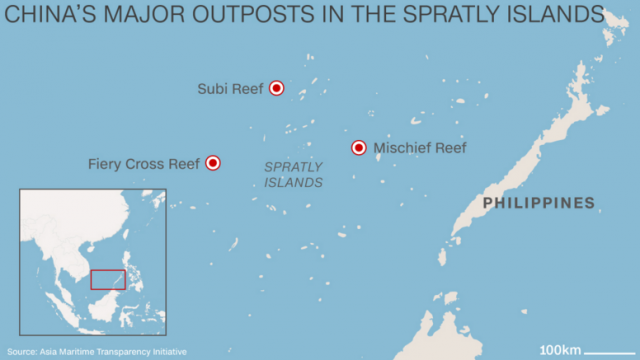Lira Dalangin-Fernandez, News5-InterAksyon
MANILA, Philippines – China’s rapid reclamation and island-building activities in disputed waters in the South China Sea occurred during the administration of President Benigno Aquino III, former President and now Pampanga Representative Gloria Macapagal-Arroyo said.
Arroyo echoed the view of former Solicitor General Estelito Mendoza, who observed that China’s “island-building factory” referring to the reclamation was active during the Aquino administration.
Arroyo, together with Mendoza and her Executive Secretary at the time, Eduardo Ermita, faced the media in a news conference to launch the primer written by Mendoza together with the Institute for Maritime Affairs and Law of the Sea of the University of the Philippines Law Center.
“What is catching attention not only of the countries bordering the South China Sea is the continuing tension, the posturing of the naval might of the US, China and other countries. That did not exist during the Arroyo administration. There was relative quiet and peace,” Mendoza pointed out.
As Mendoza described China’s aggressive island building, Arroyo interrupted, saying, “built during the previous administration, built during the previous administration.”
The primer, “The Ocean Space or The Maritime Area of the Philippines,” culled relevant laws, international treaties and provisions of the Constitution “to inform on the fundamentals of the maritime area subject to the sovereignty and jurisdiction of the Philippines.”
It quoted pertinent provisions of the United Nations Convention on the Law of the Sea, the 1987 Philippine Constitution and relevant statutes.
Mendoza served as Arroyo’s lawyer in the plunder case filed against her during the Aquino administration. The case was dismissed by the Supreme Court.
Mendoza said one of the most important achievements during the Arroyo administration was the enactment of Republic Act 9522 or the Philippine Baselines Law, which serves as basis for the country’s maritime jurisdiction and a means to establish maritime boundaries with neighboring coastal states.
“For 30 years (since the Law of the Sea Convention was approved in the 1980s), our country stood still. Theoretically, we cannot claim sovereignty over these areas because there were no recognized baselines, and that was only achieved under the Arroyo administration by RA 9522,” Mendoza said.
It was also during the time of Arroyo when the Philippines inked the Joint Marine Seismic Undertaking (JMSU) with China as well as Vietnam, under which the three countries agreed to conduct joint explorations of the disputed South China Sea, through their national oil corporations.
A case was filed against Ermita and other officials seeking to stop the JMSU, but the Supreme Court said it did not violate the Constitution.
“In the tripartite agreement, it is stated that it is just pre-exploratory and should not be misconstrued otherwise,” Ermita said.
He added: “The important thing is that, because of such undertaking, there was no tension among claimant countries.”
Asked if she recommends another joint undertaking similar to the JMSU, Arroyo said, “I cannot give specific recommendations because I don’t know all the facts available to the current administration. I can only share what happened in my administration.”
She stressed that the JMSU did not violate the Constitution because it was just “a research project.”
“When I give recommendations, it is strategic, not operational, not tactical,” she said.
“Let us concentrate on our economic ties and to the extent that we can transcend the matters and issues between us,” Arroyo added.
Arroyo’s successor, Aquino, was the chief architect of the Philippine foreign policy stance that led to the country’s petitioning the Permanent Court of Arbitration to clarify the maritime boundaries in the South China Sea.
The international tribunal issued a ruling favorable to the Philippines, which Aquino said was a “victory for all.”
President Duterte, meanwhile, has issued rhetoric and pronouncements that some quarters said were causing confusion as to the country’s position on the sea row.
Asked what she thinks about the current tact of Duterte, Arroyo said “He knows what he is doing.”










